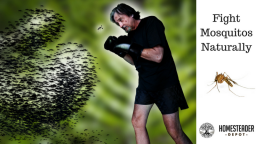BUGS…No matter how hard you try, you’ll probably find a few of them in your kitchen. They sneak in through tiny cracks in your walls, foundation, and may even hitch a ride in on someone’s shoes. Thankfully, once they’re in, you have several methods of getting rid of them that don’t require the use of pesticides. After all, you don’t want those harmful chemicals in your kitchen.
1) Put a Basil Plant on Your Kitchen Counter
Basil smells great. Many people find that its aroma adds a little something to air quality in their homes. It’s also a great additive to your foods, as it works well on things like baked chicken and pork chops. This amazing, multi-use plant can even repel any insects that try to find their way indoors. Although humans like the smell of basil, most bugs are turned off by it and will head back outdoors from whence they came. Thankfully, live basil plants are easy to find. They’re sold in the produce section of many grocery stores.
2) Place Bay Leaves Around Your Kitchen
Bay leaves can add plenty of flavor to your food, and they can keep bugs at bay. No matter the form of the bay leaves – dried or fresh – bugs hate the smell of them, so they’ll steer clear. If you’re worried about insects getting into your flour, dried beans, rice, any other grains, or the other opened containers that you have stored in your pantry, just place a bay leaf on top of them, inside of the package. You will never have to worry about weevils again. Plus, the bay leaves don’t harm the food, so everything stays edible.
>> Weird Fabric REPLACES Paper Towels – Check It out <<
3) Purchase or Make a Batch of Hot Pepper Wax Insect Spray
Along with the smell of basil and bay leaves, insects absolutely hate hot pepper spray. You can make some yourself by mixing together water, dried red pepper flakes, and even a few drops of liquid hot sauce. With that said, many stores sell this pre-mixed, as well. The liquid contains capsaicin, the stuff that makes the liquid spicy, which deters insects such as spider mites, aphids, and more. It’s harmless to plants to the point that you can spray it right on and everything will be fine.
4) Mix up Some Essential Oils
Essential oils are great for clearing out your sinuses, relieving stress, and much more. But did you know you can even mix a few of them together and use them to ward off insects? Some suggestions include tea tree oil, lavender, lemongrass, citronella, and peppermint. Mix them into a spray container and mist the corners of your kitchen.
5) Place Some Food Grade Diatomaceous Earth in Your Kitchen
Food-grade diatomaceous earth won’t harm humans, but it does kill insects. It will remove all of the moisture from the insect’s casing, forcing it to dehydrate and die. Now there’s an easy solution to your insect problems!
6) Make a Fly Trap Out of Vinegar
Vinegar, which is a great all-natural cleaning solution, is also one of the crucial components of a fly trap. Place a little bit of vinegar in a bowl (you can use either white vinegar or apple cider vinegar – both will work just fine), and then add in a bit of dish soap. Fruit flies will be attracted to the sweet smell of the dish soap, but when they hit the liquid, the vinegar will kill them. You can set a trap by placing some plastic wrap over the top of the bowl and poking a few holes in it. The flies will get in, but they can’t get out.




